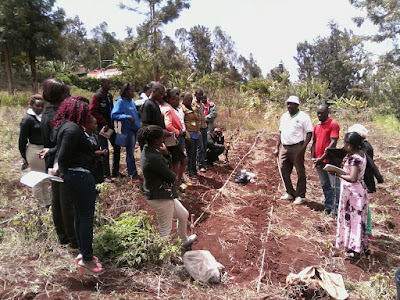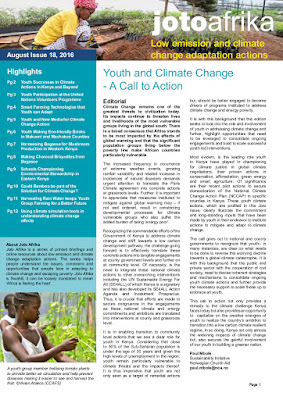By Bob Aston
The t-shirt attracted his attention. He wondered what the inscribed word ‘Sokopepe’ meant. He read the word ‘Farm records, Profitable and Agribusiness’ at the back of the t-shirt and his curiosity rose.
He approached the person wearing the t-shirt, introduced himself as Mr. Joseph Kaaria Mberia and asked:” What is Sokopepe all about?”
Over a glass of milk at Meru Dairy Milk Bar at Nyaki East Ward in Meru County, Mr. Meshack Kirimi Magiri, a lead farmer at Gaitu Farmer Group took Mr. Mberia through what Sokopepe does.
Mr. Magiri narrated to Mr. Mberia how he came to associate with Sokopepe’s Farm Records Management Information System (FARMIS) and how it has enabled him to increase his production and profit from his agricultural enterprises.
“Sokopepe has trained and mentored me on conservation agriculture. I now train farmers who are working with Sokopepe and Food and Agriculture Organization,” said Mr. Magiri.
 |
| Mr. Joseph Mbaria (L) looking on during a conservation agriculture training |
Mr. Magiri then linked him to Mr. Josphat Musenze, a Sales and Marketing officer at Sokopepe.
The following day he travelled to Meru town to hold talks with Mr. Musenze at Sokopepe's office. An hour later, he had paid the Kshs. 500 subscription fee and received a Farm Book. He embarked on mobilizing farmers around Nyaki to receive training on conservation agriculture and record keeping from Sokopepe.
Learning that he will be able to realize higher yields and also reverse the effects of soil degradation caused by mechanical tillage made him set aside a quarter of an acre as a demonstration plot for conservation agriculture.
He decided to form a farmer group, which now acts as an entry point to Ntani village and Nyaki East Ward farmers.
“I believe in learning through asking. FARMIS will help us in crop selection, adoption of agricultural innovations and good management practices. We will be using the record keeping data to know which crops are more profitable,” said Mr. Mberia.
Mr. Mberia retired from the Kenya military as a medical officer in July 2016. He decided to concentrate on dairy, poultry and crop farming in his 2 acre farm.
He said that Sokopepe has enabled him to know how much he is investing in each enterprise and projected income from each crop. Every Thursday Ms. Alice Mukami, a Production Information Agent (PIA) at Sokopepe visits his farm to check the progress of his agribusiness and to assist him fill his farm book.
Mr. Mberia has been a staunch advocate of Sokopepe amongst farmers. His conviction that empowering farmers would enhance food security has seen him elected as a coordinator of Sokopepe lead farmers group.
Sokopepe is planning to use close to 2000 lead farmers in Meru County to help increase agricultural production. The social enterprise believes that farmer-to farmer approach to agricultural extension enhances innovations adoption.









